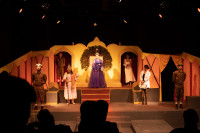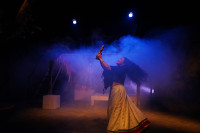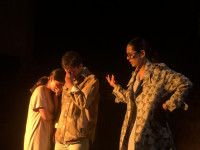Theater
When mythology mirrors life
Directed by Rajan Murarung and written by Kiran Chamling Rai, Mandala Theatre’s ‘Bakhaamma’ is mystical, mesmerising and memorable.
Anusha Dhakal
Is everything predetermined? Is human life merely a replication of what was left behind by the holy, the divine, the deity? Are some things just meant to be? Mandala Theatre explores these inquiries through ‘Bakhaamma’, where the lines between the mystical and ordinary blur through grandeur production and evocative performances.
‘Bakhaama’ tells the story of Saya and Sikhum, whose love blossoms on the Salpa-Sailung mountain, the very site where the Kirati deities Sumnina and Paruhang also fell in love. When their love compels them to elope, the community comes together to recount the story of deities who followed a similar destiny, which ultimately leads to societal acceptance of their marriage.
Kirati Mundum is an oral tradition, where the communities tell the story of the “First Man,” emerging on the earth. The content and stories of the Mundum are found to be slightly different in different Kirati communities, but the general narrative remains the same.
Human life is spent pursuing meaning, we are inherently inquisitive creatures. Cultural identity is closely intertwined with mythology and humans have always interpreted their existence and their purpose within their existence through stories that have been passed down through generations.
The writers of this play expressed that their aim through the play is to spread the culture and stories that were faithfully preserved by their ancestors. In this production, the retelling of mythologies integral to the Kirati community was done remarkably. When mythology is preserved, so is cultural identity and using an art form like theatre gives artists the space to aesthetically discuss and analyse the philosophies and values that have shaped their communities.
The storytelling in the play is grappling, it is almost impossible to keep your eyes away from the stage. There is so much going on on the stage, with even background characters engrossed in their worlds. The grand set design and appropriate period costumes also add to this immersive experience.
The integration of animals in the story felt outlandish but in a good way. The sequences with animals portray the Kirati community’s belief in animalism: the belief that animals, as well as trees, rivers and other natural entities, possess a spirit, agency and free will, much like humans.
The actor who played a bee truly stood out for his delightful performance as the goddess Sumnima’s close confidant. The actors portraying butterflies and bees embodied the innocent wisdom of insects, spreading joy with their performance. It was wonderful to see how much they were enjoying themselves.
However, there were moments when the playfulness of these characters felt excessive and as the performance went on, it became less amusing and more exaggerated. The way Sumnina befriended and interacted with her friends, animals and insects was a warm portrayal of the importance of being in harmony with nature. This play beautifully showcased the Kirati community’s appreciation and profound connection to nature, reflecting their knowledge, values and traditional ecological wisdom.
Alisha Rai truly radiates in this play. She stands out in her performance as the innocent, lovely Saya, as well as the unwavering yet gentle goddess Sumnina. She displays a variety of emotions in her performance and they are just as impressive as her expressive acting.
A prominent theme explored is love, encompassing not only romantic love between a man and a woman, as depicted in sequences portraying the love story of Paruhang and Sumnina, but also maternal love and love within a community.
Watching the beautiful tableau of the community interacting in the play was so joyous—the actors brought vibrancy to the stage. The music elevated this, the incorporation of various folk songs as well as instrumentals by Nepathya enriched the liveliness of the production.
Saya’s mother delivered a truly powerful performance. Having met her husband at Salpa-Sailung and also having lost him there, the mountain holds a deep bittersweet significance for her. Especially after her daughter elopes on that very mountain, the mother’s heart is filled with perplexity.
She doesn’t know how to react, so she suppresses her emotions and remains silent. She isn’t extremely disappointed in her daughter's decision, but she isn't happy either. Instead, she grapples with bittersweet emotions because her daughter is about to move to her new husband's house.
Poignantly, this situation reflects her loneliness; she lost her husband, in the same mountain, and now, because of that very mountain, her daughter will be away from her. During her daughter’s Bidhai ceremony on the wedding day, the mother stands on the stage, staring at the sky as tears well up in her eyes, this in my opinion, was a perfect moment in the play. Her emotions during this moment transcend beyond the stage and toward the audience, captivating them.
Despite the many positive aspects of the play, there were times when the audience experienced problems with comprehensibility, especially due to two actors portraying multiple roles. While this may have held some symbolic significance, its execution in the play led to considerable confusion. Repetitions regarding a goddess emerging from the mountain were noticeable in the play, and it became challenging to follow the significance of various characters’ names at times. Additionally, a moral message seemed to be present in the storyline, but due to the messy transitions between scenes, it ultimately vanished.
The writer made a point to acknowledge the various flaws still present in the production, which I deeply appreciate. During the play’s conclusion, he mentioned that the entire team was committed to refining both the writing and acting of the play as time went on.
‘Bakhamma’ offers a faithful portrayal of the Kirati Mundum, integrating traditional musical and wardrobe elements. Its lasting impression is owed to its innovative storytelling leading to the preservation of the stories and cultural heritage of the Kirati community. The overwhelming love shown for this play by audiences alone is a testament to its significance in fostering the growing excitement of theatre culture in Nepal.
‘Bakhamma’
Director: Rajan Murarung
Cast: Alisha Rai, Sachin Ratna, Anil Subba, Sangmi Sunuwar
Language: Nepali
Duration: 1 hour 45 minutes
‘Bakhamma’ will be shown at Mandala Theatre in Thapagaun, New Baneshwar, Kathmandu, until May 27.
Showtimes: 5:30 pm (every day except on Mondays) Additional show at 1 pm (every Saturday).




 18.12°C Kathmandu
18.12°C Kathmandu











